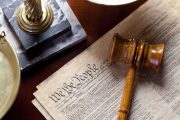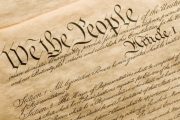With the Obama administration-backed “net neutrality” takeover of Internet infrastructure paving the way, federal bureaucrats may seek to regulate the content of websites such as the Drudge Report. That is the warning of Federal Communications Commission (FCC) Commissioner Ajit Pai, who cautioned in various interviews and talks this month that another Washington, D.C., bureaucracy — the Federal Election Commission — needs to be watched closely lest the government “impulse” to regulate online speech be acted upon. The United Nations and various UN member regimes hope to censor and tax the Internet, too.
FCC Commissioner Pai, one of two Republicans on the five-member commission, was also an outspoken opponent of his bureaucracy’s Internet takeover earlier this year under the guise of “net neutrality.” The Obama-backed plan seeks to regulate the architecture of the World Wide Web as a “public utility,” supposedly to keep it “neutral” and prevent Internet Service Providers (ISPs) from using different business models that might speed up the delivery of certain content over that of other sites. But that may be just the proverbial camel’s nose under the tent vis-à-vis government regulation of the Internet, Pai warned.
“I could easily see this migrating over to the direction of content,” he explained in during a panel discussion at the “Right Online” conference earlier this month. “What you’re seeing now is an impulse not just to regulate the roads over which traffic goes, but the traffic itself…. It is conceivable to me to see the government saying, ‘We think the Drudge Report is having a disproportionate effect on our political discourse. He doesn’t have to file anything with the FEC. The FCC doesn’t have the ability to regulate anything he says, and we want to start tamping down on websites like that.’”
Pai also said he did not think it was “unthinkable” that some government bureaucracy would consider the marketplace of ideas to be “too fraught with dissonance” — that media outlets ranging from Drudge to Fox News and everything in between would be seen as “playing unfairly” in the online “political speech sandbox.” The First Amendment is more than just words in the Constittion, it is “an ongoing cultural commitment,” he added. “And I sense that among a substantial number of Americans and a disturbing number of regulators here in Washington that online speech is [considered] a dangerous brave new world that needs to be regulated.”
The FCC commissioner reiterated his warnings last week on Fox News Radio’s The Alan Colmes Show. Among other concerns, Pai warned that the federal government’s “net neutrality” takeover of the Internet’s infrastructure could be a mere sneak preview of D.C. efforts to regulate content on media powerhouses such as the Drudge Report. “It’s not so much the FCC that I’m worried about in terms of online content regulation,” he said. “But what we do see is that at places like the Federal Elections Commission there is a regulatory impulse to regulate what heretofore has been a pretty open marketplace of ideas.”
“Net neutrality would insert government jurisdiction over the infrastructure of the internet and in time, other agencies might try to regulate the content,” added Pai, a leading critic of the Obama-backed “net neutrality” scheme, who said he had suffered from harassment and threats after speaking out. “If you look at what some of these agencies are thinking about doing right now — last year, for example, at the Federal Elections Commission, three regulators suggested that they did want to consider online content, like the Drudge Report, potentially as an in-kind contribution given that it had an impact on political campaigns.”
The notion that the FEC, under the guise of regulating elections, might seek to regulate the political speech found online is hardly far-fetched. In fact, last year, a top Democrat on the commission, FEC Vice-Chair Ann Ravel, openly advocated a new regulatory regime to control online campaigning. “A reexamination of the commission’s approach to the Internet and other emerging technologies is long overdue,” she claimed following a battle over whether two anti-Obama YouTube videos in Ohio were a violation of existing FEC decrees.
Seeing through the call, the Republican FEC chairman, Lee Goodman, warned that Democrats on the commission were targeting online political sites and even media outlets such as the Drudge Report for regulation. “I told you this was coming,” he told the Washington Examiner, adding that if regulations could be extended in accordance with Democrat wishes, anyone writing a political blog, running a news site, or even a chat room could face stifling FEC regulation on speech. Goodman had already warned that Democrat commissioners were targeting conservative Internet sites before that.
If it materializes, FEC regulation of online political speech could smother First Amendment protections for some of the unalienable rights outlined therein: freedom of speech, freedom of the press, and more. Among other attacks, FEC bureaucrats could force even small-time bloggers and other activists who might be involved in writing about elections or candidates to obey a never-ending deluge of federal regulations. For a major operation, that might not be the end — they could afford armies of attorneys to sort through it. But for a smaller outfit, filling out mountains of paperwork and being forced to obey incomprehensible mountains of decrees could prove fatal. And maybe that is the point.
Of course, the FEC, FCC, and other U.S. bureaucracies are hardly the only threat to Internet freedom. The United Nations and many of its myriad autocratic member regimes are also busy plotting an Internet takeover, as The New American has been reporting for years. As if to justify concerns over escalating UN attacks against online free speech, the bureaucracy leading the charge for global regulation, the UN International Telecommunication Union (ITU), recently installed as chief a Communist Chinese operative from mainland China who believes censorship is all in the eye of the beholder.
“We [at the ITU] don’t have a common interpretation of what censorship means,” the recently installed secretary general of the UN agency, Houlin Zhao, was quoted as saying by the Korean Yonhap news agency last year. “A country can ask people not to watch pornography, and some consider this as also kind of censorship. We have not got a common definition.” When asked about the Communist Chinese dictatorship’s massive censorship regime targeting dissent, dissidents, and ideas it disagrees with, Zhao was evasive. “Some kind of censorship may not be strange to other countries,” he responded.
The brutal dictatorship in Beijing is hardly alone, and in fact, the Obama administration has been accused of tacitly aiding and abetting the UN’s bid for a greater role in overseeing the Internet, along with a coalition of establishment-minded “stakeholders” and foreign governments. More than a few experts have spoken out on the subject, including UN designs on extorting global Internet taxes from humanity to fund further UN plotting. “Should the U.N. end up in charge, it would have a chokehold on the global economy and a vast stream of revenue that would make it even more unaccountable than it already is,” warned financial economics Professor Karl Borden at the University of Nebraska.
From Washington D.C. and UN headquarters in New York to Moscow, Beijing, and everywhere in between, totalitarian-minded forces are up in arms about the free and open Internet — essentially the final bastion of real free speech and a truly free press, and potentially a crucial tool in freeing humanity from government tyranny. Among other concerns, the World Wide Web has facilitated a massive increase in public understanding surrounding the goals of those same totalitarian-minded forces — hence their efforts to control, regulate, censor, and tax it.
For the sake of humanity and especially liberty, Americans must resist any and all efforts to infringe on Internet freedom. Without it, free speech and much more may become a thing of the past.
Alex Newman is a correspondent for The New American, covering economics, education, politics, and more. He can be reached at [email protected]. Follow him on Twitter @ALEXNEWMAN_JOU.
Related articles:
Chinese Communist to Lead UN Agency Seeking to Control Internet
Net Neutrality: Beginning of the End of the Internet?
E-mails Show Collusion Between IRS and FEC to Target Conservatives
UN Seeks to Criminalize Free Speech, Citing “Human Rights”
Senate Dems Take Aim at First Amendment
McCain-Feingold and Free Speech
UN May Tax and Censor Post-U.S. Internet, Experts Warn
Who Will Control Your Internet?
UN October Summit Reopens Grab for Global Internet Control
Internet “Governance” Summit in Brazil Advances UN Control
UN, Islamists & Communists Push Global Internet Regime
UN Bid to Seize Internet Fails but Threat Remains
After UN Internet Grab Fails, China Seeks to End Online Anonymity
UN Using Propaganda to Defend Proposed Internet Regime




